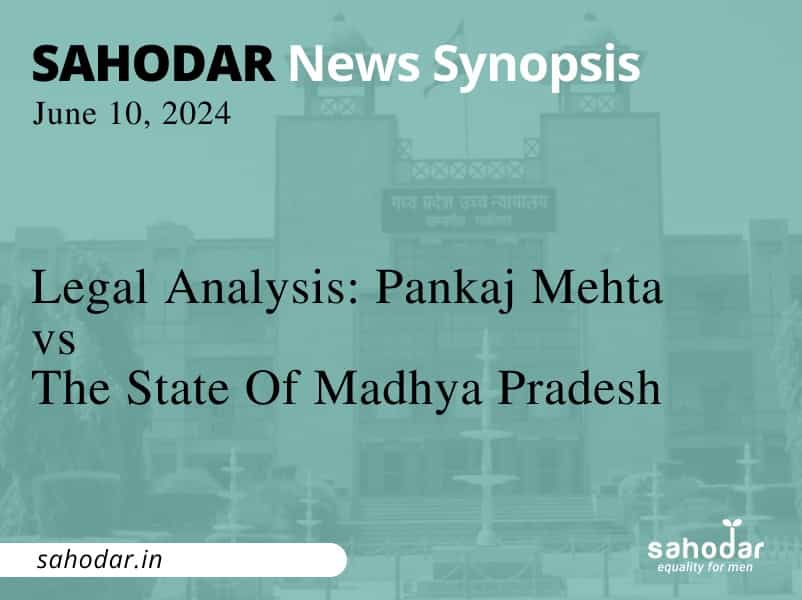Background
The complainant (wife) had an FIR registered as Crime no. 124/2021 at Police Station Mahila Thana, Indore for offenses under Sections 498-A, 323, 34 of the Indian Penal Code and Section 3/4 of the Dowry Prohibition Act. Subsequently, a petition was filed under section 482 of Cr. P.C. by the applicants for quashing of the FIR.
Issue
Should the FIR bearing Crime no. 124/2021 and the proceedings initiated concerning it be quashed?
Analysis
The petitioners pleaded that since divorce has already been granted by the Australian Courts, the applicants have been falsely accused, as a result, the FIR has been lodged over a false substratum. they also alleged that the FIR was only filed with the aim of vengeance against the applicants. based on these two factors the applicants asked for the FIR and the respective proceedings to be quashed.
Afterward, an application under section 320 of Cr.P.C. was filed by both the parties and the factum of compromise has been verified by the Principal Registrar of this Court. It was also submitted by the counsels for both parties that the applicants and the respondent have agreed that none of them would initiate any other legal action or complaint against each other or the family members of each other about this matrimonial alliance. As a result, it was argued that the continuance of criminal proceedings would lead to sheer waste of time and resources of the court and also harassment of both parties.
Reliance was placed upon a judgment delivered by the Apex Court in the case of Gian Singh Vs. State of Punjab and Anr. reported in 2012 Cr.L.R. (SC) 883 and it was summarized that whether the power to quash the complaint or FIR or criminal proceedings depends on the facts and circumstances of each case and no categories can be formed.
For instance, heinous or serious offenses like rape, murder, dacoity, etc. cannot be quashed even if the offender or the victim’s side had come to a settlement because such offenses aren’t private in nature and have a serious impact on society. Similarly, any compromise between the victim and offender in crimes that involve special statutes like the Prevention of Corruption Act or the offenses committed by public servants while working in that capacity, etc. cannot be served as a basis for quashing.
But the criminal cases having overwhelmingly and pre-dominatingly civil flavor stand on a different footing for quashing, particularly the offenses arising from a commercial, financial, mercantile, civil, partnership or such like transactions or the offenses arising out of matrimony relating to dowry, etc. or the family disputes where the wrong is private or personal in nature and the parties have resolved their entire dispute, the high court may quash the criminal proceedings if it sees it within its view.
High Court must consider whether it would be unfair or contrary to the interest of justice to continue with the criminal proceeding or whether continuation of the criminal proceeding would be tantamount to abuse of the process of law despite settlement and compromise between the victim and wrongdoer and whether to secure the ends of justice.
Reliance was also placed on the judgment of Hon’ble Apex Court in the case of B. S. Joshi v. State of Haryana, (2003) 1 DMC 524 (SC) and it was held that the High Court in the exercise of its inherent powers can quash criminal proceedings or FIR or complaint and Section 320 of the Code does not limit or affect the powers under Section 482 of the Code.
Court is of the considered view that the aim and object of law is not only to punish the offenders, but also to maintain peace, tranquility, and harmony in the respective society. In the case at hand, the complainant and members of the family of her husband have settled their disputes and have decided to live separately, this is not only good for society but also beneficial for their remaining life.
Held
Given the judgment laid down by the Supreme Court in the case of Gian Singh Vs. State of Punjab and Anr. (Supra) and B. S. Joshi v. State of Haryana (supra), the court held that continuing the criminal proceedings would go against the objective of the law, which is to maintain peace and tranquillity. As a result, the proceedings of RCT/7856/2021, pending before the learned trial court, have been quashed.
Conclusion
Under Section 482 of the CrPC, the High Court has given inherent powers wherein the Court can quash criminal proceedings when it decides that continuing the case would go against the aim of the law which is to maintain peace and tranquility. Such type of compromise should be encouraged for maintaining matrimonial relations between the parties so that the parties can settle their disputes amicably instead of fighting each other in court of law where it takes years and also precious time of the courts, which may be better spent on other cases.

